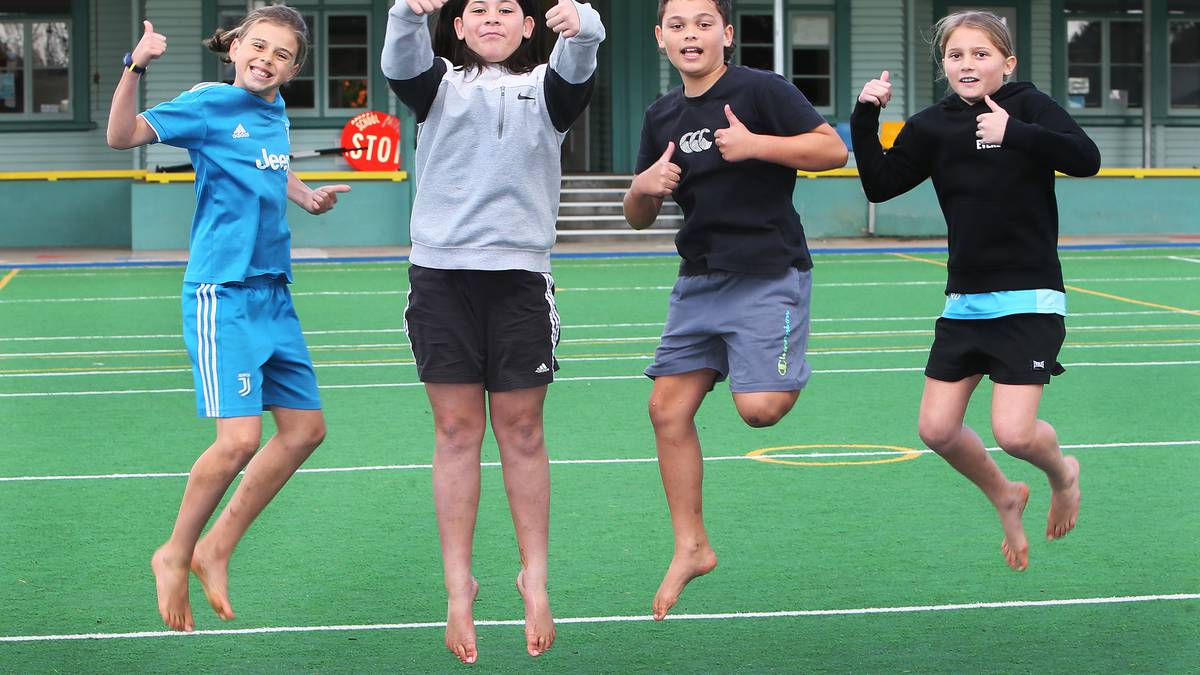Kamo Primary School students want to see their absent friends back in school (from left) Zavier Harris (10) Caysha-Laurel Parry (10) Trey Williams (10) and Waimiringa Henare (10). Photo / Tania Whyte
A new campaign aiming to get children back into school and overcome Northland’s truancy problem has started in the region.
The “Let’s Get to School” – E Te Tai Tokerau – Hoake tātou ki te
kura – campaign was released last week in a bid to encourage tamariki back through school gates after attendance numbers dwindled during the Covid-19 pandemic and subsequent lockdowns.
The new initiative is a partnership between Northland schools and the Ministry of Education Tai Tokerau office. The campaign name, slogan “For the future of our tamariki”, and key messaging have been formed by students from Kamo Primary School, Hora Hora Primary School, Tikipunga High School, and Taipa Area School.
Te Tai Tokerau has the highest absence rate in the country, according to Ministry of Education data.
Principal of Kamo Primary School, Sally Wilson, has described Northland’s truancy problem as “alarming” and “distressing”.
Northland schools have been given social media kits and posters which aim to “start a conversation,” according to Wilson.
“With any campaign, a change will come out of it, so we’re spreading awareness where we can,” she said.
A mere 34 per cent of students have attended school regularly this year, compared to 64 per cent in 2019, before the Covid-19 pandemic.
/cloudfront-ap-southeast-2.images.arcpublishing.com/nzme/AH67TL7YLPVI5JGUYIB4EU3DKY.jpg)
Whilst the Covid-19 pandemic has been a key factor, Wilson says the statistics weren’t good prior to then anyway.
“We have to do some internal reflection in schools to figure out why,” she said, “because that is the big question.”
Wilson believes a range of issues is impacting lower numbers across Northland schools, with expensive uniforms, families with immune-compromised members, fear over Covid-19 and vaccinations, as well as petrol prices all key factors.
“If you’re in a rural area and have to pick petrol or power, you’re going to pick power,” she said.
She wants parents and caregivers to know that she, and all Northland principals, are there to listen and help where possible, whether it’s offering transition phases back into school life, or working alongside learning support.
/cloudfront-ap-southeast-2.images.arcpublishing.com/nzme/RAIEWUHDWDLDVSRQ55MF46I4XQ.jpg)
“We’re not here to judge,” she said, “we’re here to help.”
“It’ll be pretty hard and daunting for children who haven’t been here for a while to walk through our gates.”
Wilson said a major concern of hers is that students who aren’t regularly attending kura are missing out on key relationship-building skills, such as communicating with their peers.
She said the need for students to learn from one another is a key aspect of school, with younger students learning from their elder peers, and working alongside classmates.
Kamo Primary School students Caysha Laurel-Parry, Waimiringa Henare, Zavier Harris and Trey Williams spoke to The Northern Advocate last week about the issue and their messages for those missing out. The four students are the faces of the campaign at their school.
/cloudfront-ap-southeast-2.images.arcpublishing.com/nzme/HGEZYH5DMEOXPN6SOEOGRFWXAY.jpg)
They each agreed with Trey (10) when he said about his absent peers, “I guess we just want them to know that we don’t forget about them.”
Zavier (10) said he finds it difficult to learn effectively when his friends aren’t attending.
“It’s hard when you know you have people you work well with in class and they aren’t there,” he said, “I definitely feel like I can’t work properly.”
Zavier said he makes an effort to contact his friends when they aren’t there.
“I always say ‘come back to school; you’re missing out on so much’, because I know when they come back, they want to keep being here because it’s fun.”
Caysha (10) said she wants her fellow pupils to know that “school is a safe place to be”.
Waimiringa, (10) said she knows her friends might feel nervous coming back to school, and like no one knows them.
“I try to be a friend who can reassure them,” she said.
Wilson calls the school environment “an awesome community”.
“It’s so lovely out on the gates every morning to welcome them to school and hoping that a face is going to turn up that hasn’t been here for a while.”
/cloudfront-ap-southeast-2.images.arcpublishing.com/nzme/X6GDIRJ3O62WHREWNMGDUDMHUM.jpg)
She said attending school is a vital part of fostering healthy wellbeing and development.
“Whether their passion is the arts or technology, if they have kapa haka or are playing touch at lunchtime. They need to be there to foster that.”
It is hoped the Let’s Get to School campaign will spread a unified message that schools care about their students and are keen to work with whānau to get their tamariki back, for their future.
“Principals and teachers are keen to work with families to support transition back to school that works for all,” Kathy Hancock, Kaingaroa School principal, said.
Bay of Islands International Academy principal Chris Bell said regular attendance was not only important for academic success, but for social and emotional development too.
“Our sole focus is no longer about lifting children academically but a combination of lifting their confidence as learners, alongside lifting their ability to be effective members of communities, effective collaborators and effective communicators.”
Kaitaia Primary School principal Brendon Morrissey said students missed the social interactions at school when they were away, and he wanted whānau to know the school is safe.
“We’ve got a lot of health measures in place, and we are very conscious of our students being healthy and happy every day. It is our number one focus,” he said.
The campaign is ongoing and will continue to be rolled out through Northland schools.




